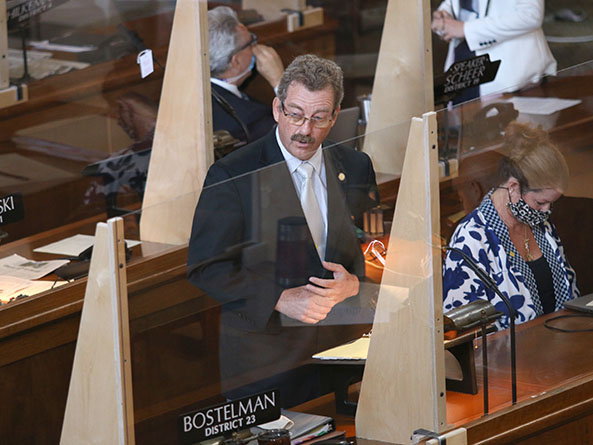EMS changes clear first round
A bill to allow emergency medical service providers to restock prescription medications from local hospital pharmacies was expanded and advanced from general file July 27.

Brainard Sen. Bruce Bostelman, sponsor of the bill, said current law allows for the transfer of prescription drugs between holders of a pharmacy license, health care practitioners and hospitals to alleviate a temporary shortage. LB1002 would add EMS providers to that list.
Bostelman said EMS providers currently must purchase and restock the medications used in treatment and transport only from wholesale drug distributors, which are not local, require minimum purchases and do not always have the necessary medications on hand.
“The bill will be a big step in assisting our state emergency medical service providers with the financial and logistical issues they currently face,” he said.
A Health and Human Services Committee amendment added provisions of three additional bills.
LB893, also introduced by Bostelman, would add community care paramedic and critical care paramedic practices as EMS providers. The amendment would direct the state Board of Emergency Services to provide education and licensure requirements for the positions.
Bostelman said the two new licensure classifications are necessary for public safety.
“Research, according to findings from the Nebraska State Board of Health, shows that paramedics currently deliver medical care using equipment and medications at a level above their education and qualifications and for which they’re not certified,” he said.
Under the amendment, licensed practical nurses would no longer be exempt from Emergency Medical Services Practice Act licensing requirements.
Bellevue Sen. Sue Crawford spoke in “enthusiastic support” of the bill and the amendment, saying EMS is essential to the state’s health care network.
“Our EMS providers are a critical part of health care access—even more critical in our rural communities,” she said.
Also included in the amendment was LB1184, originally introduced by La Vista Sen. John Arch, which would require the state Department of Health and Human Services to set standards for juvenile inpatient psychiatric units and psychiatric residential treatment facilities.
Staff would be required to be at least 20 years old, or at least two years older than the oldest resident in the facility or unit, have a high school diploma or equivalent and be trained appropriately.
Finally, LB1044, originally introduced by Blair Sen. Ben Hansen, would clarify that only consultation with—and not the approval of—a licensed physician is required for a licensed medical nutritionist to order patient diets under the Medical Nutrition Therapy Practice Act.
Following the 41-0 adoption of the committee amendment, lawmakers advanced LB1002 to select file on a 43-0 vote.


